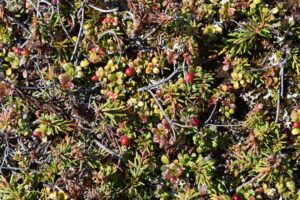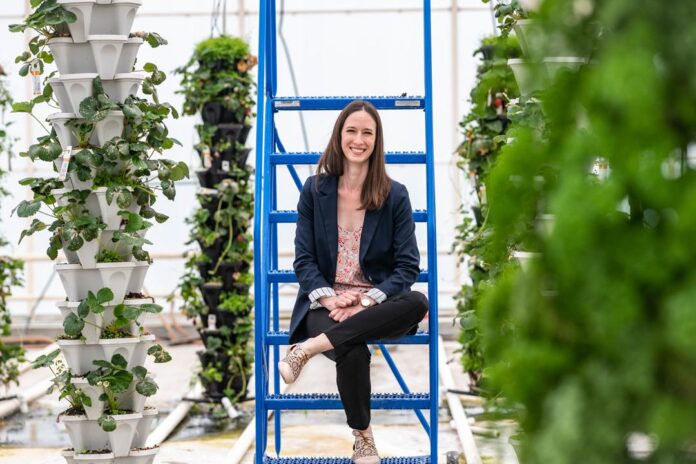In her current role as the director of the BERRi Lab, Erland primarily focuses on finding investments for research projects and spearheads various experiments focused on studying plants’ resilience to climate change. So far, she has four undergraduate students and one post-doctoral researcher working for her. However, students are always encouraged to join ongoing projects, receive hands-on experience in the BERRi lab, and even start their own research projects.
Erland’s journey as a plant biologist stems from her passion for science and an insatiable curiosity to seek answers.
“When I started grad school, I knew I wanted to do research. But I wasn’t really sure what that looked like. And as I’ve gone along, I’ve realized that I wanted to be able to investigate whatever questions I wanted to investigate.”
Dr. Erland’s first research project studied an invasive food pest called spotted wing drosophila that had appeared in the Argonne Valley.
During her undergraduate years, she spent her summers as a research student with Agriculture and Agri-Food Canada. While working in various entomology and insect ecology labs, she became fascinated with understanding volatile communication signals between insects and plants.
“It was way cooler to me that the plants could emit compounds that could basically mind control the insects than to just study the insects themselves.”

After doing an honours project and research assistantship during her undergraduate, Erland focused her masters research on lavender and essential oils focusing on how to make essential oils smell better. However, it was her doctorate degree that helped her find her true calling.
“I realized that I don’t really like molecular biology … But I figured out that I really like growing plants and understanding [their] chemical signals … my PhD was all about melatonin and serotonin in plants.”
Apart from being a professor and director, Erland has been an author and co-author of over 35 publications to date, including various plain language articles, research articles, reviews, and book chapters. Her latest publication is a peer-reviewed article regarding research on indoleamines (neurotransmitters) serotonin and melatonin in plants.
For Erland, the most exciting part of her role is being able to accomplish her dream projects — as long as she can source funding for them. One of the coolest projects she ever took part in was travelling to Nuvavut for her research and obtaining several Arctic plants for her lab.
“Now we have plants from above the Arctic Circle in the lab that we can use to study environmental responses, which is pretty cool.”
Dr. Erland follows her heart while making decisions, which enables her to enjoy what she does. She pursues what she loves, and moves away from what she doesn’t by trying new things.
When she realized she wasn’t interested in genes or DNA, she shifted her focus elsewhere. Dr. Erland observed that through this process, people can discover what interests them the most, which can be said about any field.
For Dr. Erland, the most rewarding part of her work is witnessing students appreciate and develop a passion for research the same way she does. She acknowledged that research can be a struggle and believes if it wasn’t hard, it would have been done already.
“We wouldn’t be doing the research if we already knew what the answer was. It’s a lot of trial and error; you just have to keep trying.”
Ideally, Dr. Erland envisions a future for herself with no financial constraints and the option to research whatever catches her interest.



